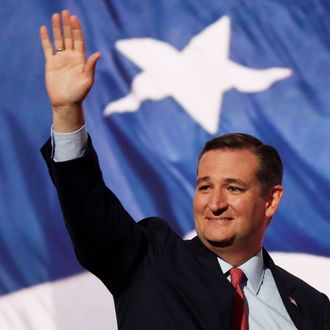
So the worst has now happened from the point of view of GOP unity coming out of Cleveland: The No. 2 candidate in the Republican presidential nominating process has refused to endorse the No. 1 candidate, giving voice to an undercurrent of dissension that was suppressed during shadowy fights over the convention rules. But now what?
Assuming Donald Trump does not succeed in quieting the intra-party waters through rhetorical enchantment tonight, the question left by Ted Cruz’s defiant non-endorsement speech Wednesday is whether the conservative resistance to Donald Trump’s candidacy will now peter out or could actually grow.
You’d normally expect it to burn off in the fires of what looks to be one of the most polarizing general elections ever. At least some of the recent polling has shown Trump consolidating the Republican vote even before Cleveland and the obligatory unity gestures. But that’s the rub: This could be the rare convention (the Democratic events in 1968 and 1972 were two others) that reduces party unity.
And indeed, Cruz’s act of defiance has emboldened the #NeverTrumpers, who looked more or less dead on Monday.
As to what happens now, a lot depends on the public reaction to this convention and the next one in Philadelphia. If the race looks tighter than ever, the pressure among Republicans to close ranks — or at least shut up with the complaints about Trump and focus on down-ballot races — could become overwhelming. Down the stretch it’s possible to imagine even Ted Cruz — if not, say, Erick Erickson, who has taken to calling Trump “Cheeto Jesus” — coming around.
But if it goes the other way and Hillary Clinton opens up a big lead after Philadelphia and it holds for a while, many Republicans who are today going along to get along may decide party survival depends on distancing themselves from Trump. And the pressure to belatedly take a stand far from Trump Tower could be especially intense for the party leaders who clearly know a Trump administration could be a long waking nightmare.
At the end of a long, impassioned article calling out Chris Christie, Tom Cotton, and Paul Ryan for their failure to stop Trump and their variable but unanimous postures of acquiescence, moderate-conservative foreign-policy writer Jeffrey Goldberg is counting on the latter scenario:
[T]hey’ve so far chosen the path of submission and expediency and rationalization. It is not, however, too late. The saving grace here is that they have until November 8th to tell the country what I believe they know to be true—that Donald Trump is singularly unfit to be president, and that the country is more important than their party, or their careers.
That’s where a convention advertised as aimed at the “normalization” of Donald Trump has left Republicans.






























